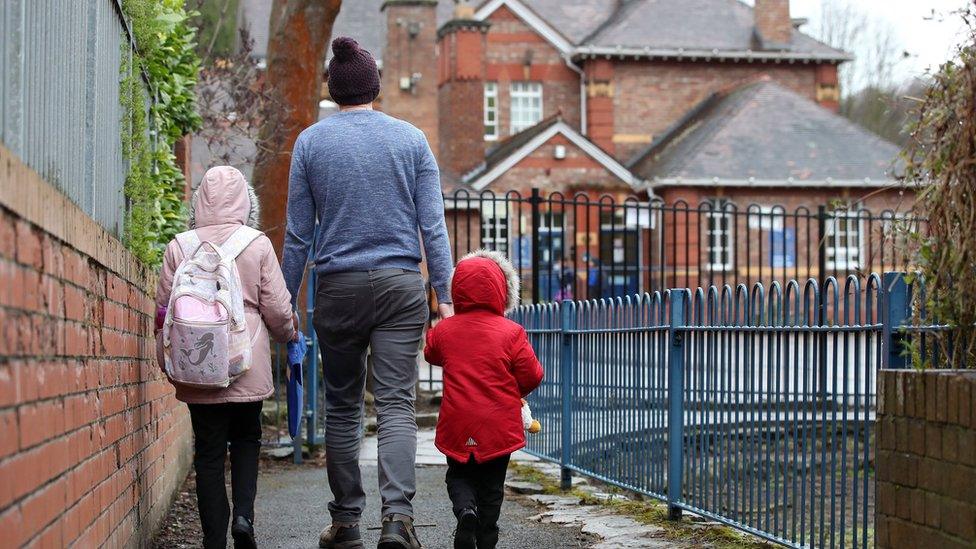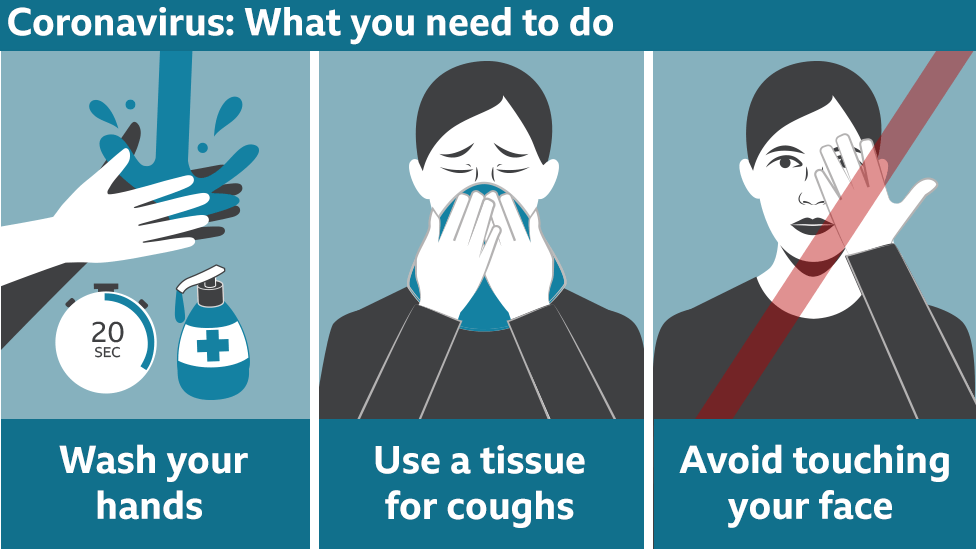Coronavirus: Teachers to estimate grades after exams cancelled
- Published

Pupils whose exams were cancelled due to the coronavirus epidemic will be given grades estimated by their teachers, the government has said.
The announcement comes as most UK schools closed their doors to a majority of pupils indefinitely in an effort to stem the spread of the virus.
But many schools will re-open on Monday with a skeleton staff to accommodate the children of "key workers".
There are concerns the hastily arranged system may struggle to cope.
Teachers in England will look at coursework, mocks and other evidence from A-level and GCSE students and will award grades.
And a process will be agreed with exam regulators and exam boards to see that pupils' "hard work and dedication is rewarded and fairly recognised".
The government has closed all schools, but what does that mean for exams, and who can still go in?
Tearful goodbyes
A similar process is likely to be followed in Scotland, Wales and Northern Ireland.
England's Education Secretary, Gavin Williamson, said cancelling exams was something no education secretary would ever want to do, but it was vital in these "extraordinary times".
"My priority now is to ensure no young person faces a barrier when it comes to moving onto the next stage of their lives - whether that's further or higher education, and apprenticeship of a job," he said.
The announcement came as hundreds of thousands of school pupils were saying sometimes tearful goodbyes to each other for possibly the last time.
Pupils at the end of primary, GCSE and A-Level students do not know whether they will see their classmates again in school.
Head teachers and local authority officials have been struggling to work out whose children they should be accommodating when schools partially re-open on Monday.
The government has published a list of key workers, external whose children can still go to school if they cannot be looked after at home.
These workers' jobs are considered "critical" for the response to the pandemic.
The list has been separated into eight categories, including frontline health workers and social-care staff, nursery and teaching workers and those involved in food production and delivery.
It also includes the police, those in key public services, transport workers and critical staff in financial services and utilities.
Northern Ireland Education Minister Peter Weir has said all schools there should be prepared to cater for key workers' children after they close on Monday.

Analysis by Hannah Richardson, BBC Education reporter
Anyone who thinks the emergency schools that are due to open on Monday will run like regular ones is wrong.
They will instead comprise a patchwork of available teachers, support staff and pupils whose parents find themselves lucky enough to be on the key workers' list.
They will not be following a specific curriculum, there will be no working towards exams and pupils are unlikely to be taught in their own year groups.
How many pupils each school can accommodate will be a daily moving picture as staff fall ill.
And head teachers will have to make some tough decisions about who can come into class - and sometimes their decisions will not be popular
One spoke of arguing with a father who asked for a place because he worked in McDonald's; others in more obviously frontline jobs have also been disappointed.
On the up side, the lucky ones may have a chance to learn in new and different ways, while their former classmates grapple with online learning from home.

Nurseries, colleges and childminders are also closing their doors, though some are being asked to re-open to accommodate key workers' children.
Vulnerable children, including those who have a social worker and those with special educational needs, will also be allowed to go to school.
Dr Mary Bousted, joint-general secretary of the National Education Union, said: "This is a very long list and could result in some schools having the majority of pupils attending."
She also called for education workers to be tested for Covid-19 to ensure safe working in schools.
She added: "There simply won't be enough education staff available for work on school sites if all members with symptoms are forced to self-isolate."
The government stressed that "every child who can be safely cared for at home should be" and asked workers to consult their employers to confirm whether "their specific role is necessary".
The Department for Education said it would help local authorities identify those "who most need support at this time".
The government has encouraged local authorities to keep residential special schools and specialist colleges open wherever possible.

Who are "key workers"?
The full list includes:
Frontline health workers, such as doctors and nurses
Some teachers and social workers
Those in key public services, including those essential to the justice system, religious staff and public-service journalists
Local and national government workers deemed crucial to delivering essential public services
Workers involved in food production, processing, distribution, sale and delivery
Public-safety workers, including police, armed forces personnel, firefighters and prison staff
Essential air, water, road and rail transport workers
Utilities, communication and financial services staff, including postal workers and waste-disposal workers

